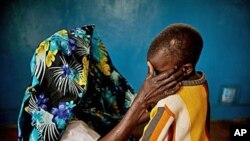The U.N. under-secretary general for humanitarian affairs has completed a visit to the DRC with a trip to a province that’s been terrorized by LRA rebels.
On Thursday, Valarie Amos went to Orientale Province, where there have been repeated brutal attacks by the rebels. They are blamed for 2,000 deaths, 3,000 abductions and the displacement of 300,000 people in the DRC since December 2007.
Maurizio Giuliano, spokesman for OCHA, the U.N. Office for the Coordination of Humanitarian Affairs in Kinshasa, says, “[Amos] met with local people who suffered a lot at the hands of the LRA. These are people who had been brutalized...kidnapped. When she came back, Ms. Amos expressed that she was deeply touched by those testimonies and she wants to make sure that the DRC will not be forgotten.”
Civilian mutilations
At the village of Bangadi, about 60 kilometers from the southern Sudan border, she met with women who had had their ears and lips cut off by the LRA.
“It’s something the LRA [rebels] usually do in order to scare off the local population. You know, you didn’t hear anything and if you saw us you cannot speak about it,” says Giuliano, adding, “I saw people who were traumatized, physically traumatized, who said they had been kidnapped for days by the LRA and repeatedly abused.”
What can be done?
The U.N. is pressing for a “much stronger presence” by MONUSCO, the United Nations Organization Stabilization Mission in the DRC, and Congolese army forces. The U.N. says the Kinshasa government has the primary responsibility of protecting all of its citizens.
Giuliano says, “We see that MONUSCO is playing an important role. It’s also a deterrent for LRA attacks and that’s why when people flee they go to…places where MONUSCO is present. The presence of MONUSCO is sporadic and tiny. We need member states of the United Nations to give a lot more resources to MONUSCO, as well as the forces of the host government, so that there can be a serious presence by those who can stop the LRA.”
While U.N. agencies and NGOs have relatively easy access to the southern part of Orientale Province, it’s very difficult elsewhere in the province due to insecurity and poor roads.
“We estimate we are able to assist about two-thirds of those in need, but there are people who cannot be assisted or at least not on a regular basis. And that’s something we’re concerned about,” says the OCHA spokesman.




